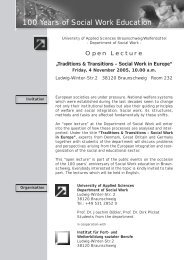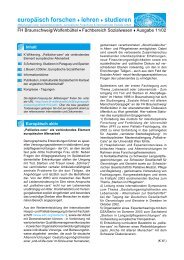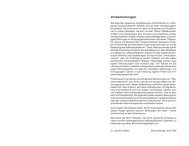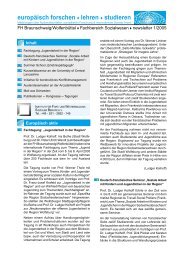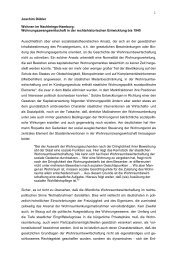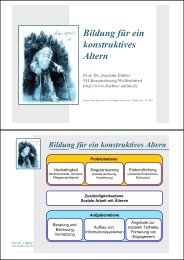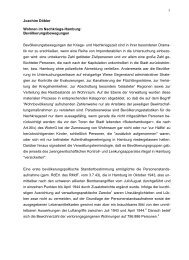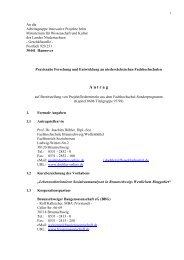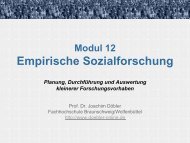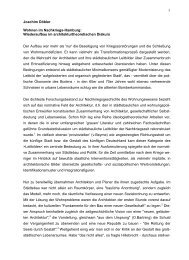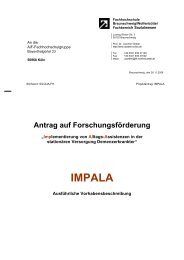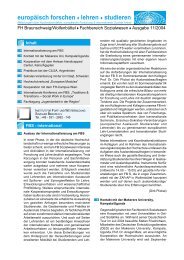CONTRIBUTIONS TO THE BOLOGNA PROCESS - Doebler-online.de
CONTRIBUTIONS TO THE BOLOGNA PROCESS - Doebler-online.de
CONTRIBUTIONS TO THE BOLOGNA PROCESS - Doebler-online.de
You also want an ePaper? Increase the reach of your titles
YUMPU automatically turns print PDFs into web optimized ePapers that Google loves.
Strasbourg, 25 January 2001<strong>CONTRIBUTIONS</strong> <strong>TO</strong> <strong>THE</strong> <strong>BOLOGNA</strong><strong>PROCESS</strong>Recognition Issues in the Bologna ProcessDirectorate General IV: Education, Culture and Heritage, Youth and Sport(Directorate of School, Out-of-School and Higher Education - Higher Educationand Research Division) of the Council of EuropeDistribution: generalDocument available on the Internet site: http:culture.coe.fr
12officers to assess them. The Diploma Supplement helps situating a qualification withinthe education system to which it belongs.The ECTS (European Credit Transfer System), <strong>de</strong>veloped by the EuropeanCommission, facilitates the transfer of credits obtained during periods of study abroad tothe home institution (or another institution), so that stu<strong>de</strong>nts will not “lose” by doing partof their work for a <strong>de</strong>gree at a foreign institution.The ENIC and NARIC Networks provi<strong>de</strong> an important forum for the <strong>de</strong>velopment ofEuropean recognition policies and practice as well as for cooperation between individualinformation centres. The two Networks cooperate very closely and hold joint annualmeetings as well as joint meetings of the ENIC Bureau and the NARIC Advisory Board.The ENIC Network also has a statutory role in the implementation of the LisboaRecognition Convention. The NARIC Network encompasses the countries of theEuropean Union and the European Economic Area as well as the Associated Countries.The ENIC Network encompasses all NARICs as well as all parties to the EuropeanCultural Convention (Council of Europe), members of the UNESCO Europe Region,parties to the Lisboa Recognition Convention and/or parties to the UNESCO RegionalConvention for Europe. The ENIC Network therefore covers all countries of Europe 2 aswell as Australia, Canada, Israel and the United States of America. While aca<strong>de</strong>micrecognition is the main area of activity of both networks, many NARICs also function ascontact points for the EU Directives on professional recognition.The Recommendation on International Access Qualifications, primarily <strong>de</strong>veloped byUNESCO/CEPES and adopted by the Lisboa Recognition Convention Committee in June1999, will facilitate the recognition of school leaving qualifications not belonging to anational education system for the purpose of access to higher education.Two important initiatives are also un<strong>de</strong>r preparation: a draft Co<strong>de</strong> of Good Practice inthe Provision of Transnational Education, <strong>de</strong>veloped by a working party for whichUNESCO/CEPES provi<strong>de</strong>d the main Secretariat, and a draft Recommendation onCriteria and Procedures for the Assessment of Foreign Qualifications and Periods ofStudy, for which the Council of Europe provi<strong>de</strong>d the main Secretariat. It is hoped thatboth texts may be submitted to the Lisboa Recognition Convention Committee foradoption in 2001.A number of other ENIC working parties have addressed specific recognition issues. Inaddition to those which have led to proposals for standard setting texts, such as ontransnational education or criteria and procedures, these inclu<strong>de</strong> the working parties onEuropean – US recognition, Russian education, the recognition of qualifications held byrefugees and the NEED group. The latter, active in the early 1990s, elaborated a firstoverview of the education and qualifications systems of the countries of Central and2 Following the political changes in Serbia from October 2000, the Fe<strong>de</strong>ral Republic of Yugoslavia isexpected to join the ENIC Network in the near future. The Fe<strong>de</strong>ral Republic of Yugoslavia has now beenadmitted as a member of UNESCO and has been invited to acce<strong>de</strong> to the European Cultural Convention ofthe Council of Europe.
13Eastern Europe after the political changes that ma<strong>de</strong> full pan-European cooperationpossible.The ACE 3 professional section of the European Association for InternationalEducation (EAIE) has both some ENICs/NARICs and cre<strong>de</strong>ntial evaluators at highereducation institutions among its members. It contributes to both the <strong>de</strong>velopment ofpolicy and good practice and to the training of cre<strong>de</strong>ntial evaluators in Europeanstandards and practice.The Multi Country PHARE programme – both the recognition strand and the qualityassurance strand - contributed to <strong>de</strong>veloping recognition practice in the participatingPHARE countries and to <strong>de</strong>velop the national information centres in these countries. Theefforts ma<strong>de</strong> within both these strands with regard to dissemination have contributed tofacilitating cooperation between recognition and quality assurance specialists.Important <strong>de</strong>velopments have also taken place at regional and national level, both in theimplementation of recognition policies and practice and not least in the training ofcre<strong>de</strong>ntial evaluators as well as in awareness raising. For example, in many countriesnational seminars have provi<strong>de</strong>d training as well as a platform for discussion. In anotherexample, Estonia, Latvia and Lithuania have conclu<strong>de</strong>d a regional agreement onrecognition, based on the principles of the Lisboa Recognition Convention. At Nordiclevel, there is also a well-established cooperation in the field of recognition, both on thebasis of the 1975 Sigtuna Agreement, through cooperation in the framework of theNordic Council of Ministers and between the Ministries of Education of the Nordiccountries and through the Nordic Association of University Administrators (NUAS).There have also been important <strong>de</strong>velopments at institutional level, not least in the<strong>de</strong>velopment of double or multiple <strong>de</strong>gree programmes where stu<strong>de</strong>nts obtain elementsof their <strong>de</strong>gree at two or more institutions. The institutional agreements which form thebasis of these programmes represent a very concrete form of recognition.All of the above <strong>de</strong>velopments have contributed to and partly codified what is perhaps themost important <strong>de</strong>velopment of all: a change of attitu<strong>de</strong>s toward recognition. Instead ofmaking <strong>de</strong>tailed comparisons of reading lists and curricula, the assessment of foreignqualifications is increasingly seeking to <strong>de</strong>termine whether applicants have a comparablelevel of skills and competence as they would have had if they had held a <strong>de</strong>gree of thehome countries. This shift is reflected also linguistically, in that there is less talk about“equivalence” and more about “recognition”.3 Admission officers and Cre<strong>de</strong>ntial Evaluators. For further information, please see the ACE web page:http://www.lu.lv.ace.
12<strong>THE</strong> WAY FORWARDWhile much has been achieved, much remains to be done. In this section of the paper, aseries of consi<strong>de</strong>rations and questions will be formulated, and possible action is suggestedas a way to meet the challenges <strong>de</strong>scribed.First consi<strong>de</strong>ration: the legal framework for recognition is largely in placeThe backbone of this framework is the Council of Europe/UNESCO Lisboa RecognitionConvention and the EU Directives on recognition for professional purposes. It can evenbe argued that we are reaching the limits of what can be regulated through legalprovisions. Legislation is only useful to the extent that it can be implemented orenforced. Implementation or at least enforcement presupposes that States 4 or supranationalbodies 5 have a minimum authority in the matter. For aca<strong>de</strong>mic recognition, thehigher education institutions operate within a general framework of institutionalautonomy. While they are bound by general regulations, there are therefore limits todirect state influence on the recognition <strong>de</strong>cisions reached by individual institutions.New <strong>de</strong>velopments, like transnational education or other new forms and types ofeducation, are also increasingly important, and some of these <strong>de</strong>velopments are notclearly linked to territorial jurisdiction. It is not clear that national orinternational/European legal authority is sufficient for legal measures to be a viable formof regulation of these <strong>de</strong>velopments.While the international legal framework largely seems to be in place, there may,however, be a case for reviewing national legislation to verify that it is compatible withthe international legal framework as well as to consi<strong>de</strong>r the possibility and <strong>de</strong>sirability ofestablishing further agreements at regional level.Suggested action(i)(ii)(iii)Countries in the European Region which have not yet done so,should be encouraged to sign and ratify the Council ofEurope/UNESCO Lisboa Recognition Convention;National authorities should be encouraged to reconsi<strong>de</strong>r theirnational laws concerning the recognition of qualifications to makesure they are compatible with the international legal framework.In this process, they should make good use of ENICs/NARICs, ascentres of competence on recognition matters and on structures andqualifications in a broad range of countries.National authorities should also be encouraged to establishregional and/or subject based agreements, where appropriate. Such4 Whether through central authorities or through local and regional authorities, cf. Section II of the LisboaRecognition Convention.5 Like the European Court of Human Rights (Strasbourg) with regard to the European Convention onHuman Rights or the European Court of Justice (Luxembourg) for EU legislation.
13agreements can be useful tools for concretizing the more generalprovisions of the Lisboa Recognition Convention and applyingthem among a group of neighbouring countries. Such agreementsshould be non-discriminatory and focus on implementing theEuropean framework at regional level. They should not containprovisions which would make it more difficult or cumbersome torecognize qualifications from outsi<strong>de</strong> of the region in question, or<strong>de</strong>livered in subjects or aca<strong>de</strong>mic disciplines other than thosecovered by the agreements.Second consi<strong>de</strong>ration: continuous efforts will be nee<strong>de</strong>d to improve the implementationof the legal frameworkWhile the European legal framework for recognition is essentially in place and we maybe close to the limits of what can be achieved through legislation, the European HigherEducation Area will only be established through continuous efforts to improve theimplementation of this framework through improved information on recognition issues(see third consi<strong>de</strong>ration, below) as well as through a number of other measures, inparticular through the further <strong>de</strong>velopment of standards and through institutionalagreements and contacts.Standards should here be taken to mean agreed norms for conduct or profile 6 rather than aharmonization of <strong>de</strong>grees and study programmes, which would go against the Europeantradition of diversity. These standards will most likely not be binding legal instrumentsbut standards which countries or institutions may adhere to or implement on a voluntarybasis, such as recommendations and, in particular, co<strong>de</strong>s of good practice. They may besubsidiary texts to the Lisboa Recognition Convention or they may be elaborated in othercontexts. They may address overall recognition issues or be elaborated for one or a smallgroup of aca<strong>de</strong>mic disciplines or subject areas. In the latter case, they should besufficiently flexible to allow candidates to move easily not only between educationsystems but also between subject areas, in or<strong>de</strong>r to facilitate career reorientation.Even if such texts may not have formal legal status, this does not mean that they are lessimportant in practice, as there may be consequences for those who do not adhere. Forexample, one of the intentions with the Co<strong>de</strong> of Good Practice in the Provision ofTransnational Education is clearly that education programmes that do not comply withthe Co<strong>de</strong> will generally not be given recognition, but it is also that programmes which docomply should also have some kind of assurance that the qualifications they issue will befairly consi<strong>de</strong>red for recognition. Different kinds of instruments may be envisaged,ranging from Recommendations adopted by the Lisboa Recognition ConventionCommittee to co<strong>de</strong>s of good practice. It seems reasonable to assume that <strong>de</strong>velopinggood practice in various areas of recognition may be particularly important in the years to6 One can also talk about European standards in other areas, e.g. human rights, where standards tend to becodified, or aca<strong>de</strong>mic freedom and university governance, where standards are largely unwritten.
12come, and an area in which the ENIC and NARIC Networks could play a consi<strong>de</strong>rablerole.Double and multiple <strong>de</strong>gree programmes are one of the important achievements inrecognition over the past <strong>de</strong>ca<strong>de</strong> or so. Organized mobility programmes, such asSOCRATES or NORDPLUS, also presuppose institutional agreements on recognition.As these kinds of aca<strong>de</strong>mic mobility become more important, the need for institutionalagreements, especially on the recognition of periods of study, will increase. This will beparticularly important for recognition for aca<strong>de</strong>mic purposes, but will indirectly beimportant also for recognition for professional purposes.It is, however, important to un<strong>de</strong>rline that institutional agreements and good practiceshould be <strong>de</strong>veloped within the framework of the European framework for recognition,such as the Lisboa Recognition Convention. Institutional agreements should be seen as aform of implementation of this overall framework. They may cover a wi<strong>de</strong> range ofdisciplines or be subject based. The Diploma Supplement, elaborated jointly by theEuropean Commission, the Council of Europe and UNESCO-CEPES, and the ECTS(European Credit Transfer System) are important tools <strong>de</strong>signed to facilitate therecognition and transfer of qualifications and credits between higher educationinstitutions. ENICs and NARICs can provi<strong>de</strong> valuable assistance and advice on theelaboration of inter-institutional recognition agreements.Suggested action(i)(ii)(iii)(iv)(v)the ENIC and NARIC Networks, as well as the Lisboa RecognitionConvention Committee, should give the highest priority to implementingthe European legal framework for the recognition of qualifications, todisseminate information on this legal framework and to <strong>de</strong>velop an<strong>de</strong>ncourage good practice. ENICs/NARICs should play the same role atnational level, in cooperation with Ministries and higher educationinstitutions.in this, they should consi<strong>de</strong>r further <strong>de</strong>veloping European norms that couldcontribute to further <strong>de</strong>veloping good practice.the ENIC and NARIC networks as well as national authorities and highereducation institutions should work to implement the Diploma Supplement;ENICs/NARICs as well as higher education institutions should seek toexpand the use of the Diploma Supplement and the ECTS;ENICs and NARICs should provi<strong>de</strong> assistance and advice on theelaboration of inter-institutional recognition agreements.
13Suggested action(i)(ii)the ENIC and NARIC Networks should <strong>de</strong>velop methodologies,procedures and <strong>de</strong>scriptions adapted to the needs of the assessment ofqualifications for the non-regulated part of the labour market;the ENIC and NARIC Networks, as well as national authorities andindividual ENICs/NARICs, should <strong>de</strong>velop contacts with employers,professional bodies and other labour market partners in or<strong>de</strong>r to improveinformation and training on recognition issues.Fifth consi<strong>de</strong>ration: there will be an increasing number of applications for therecognition of non-traditional learningThis has to do with changes in the way in which knowledge and skills are <strong>de</strong>veloped andconveyed – i.e. changes in teaching and learning. The traditional classroom or campuswill be the setting for a smaller proportion of the overall education effort. More educationwill be <strong>de</strong>livered through the Internet, through transnational arrangements, through acombination of traditional and non-traditional learning, through the recognition of variouskinds of prior learning, including work based and technology based learning.Much non-traditional learning will be provi<strong>de</strong>d on a different time scale. For this, lifelonglearning is a key concept, but not “just” in the form of specifically <strong>de</strong>signed courses forthose already employed who have a <strong>de</strong>gree, who need to <strong>de</strong>velop their competencefurther, and who are prepared to pay substantial fees for this (or whose employers areprepared to do so). Rather, lifelong learning will become a better integrated part of themission of higher education. One crucial question will be whether to <strong>de</strong>velop a separateset of qualifications for non-traditional learning, or whether to integrate non-traditionallearning into the overall qualifications structure 8 . The former option risks branding nontraditionallearning as second rate, and the questions of recognition will still have to be<strong>de</strong>alt with. The second option requires substantial rethinking of the way qualifications areearned and recognized. The concept of learning paths should be ad<strong>de</strong>d to the concept ofstudy programmes: rather than talking about non-traditional qualifications, the aim shouldbe to <strong>de</strong>velop alternative paths to a common set of qualifications and to assess thesequalifications on the strength of the skills and competencies they convey rather than onthe way in which the qualifications were earned.Suggested action(i)national authorities as well as the Council of Europe, UNESCO, theEuropean Commission and other international organizations shoul<strong>de</strong>xplore ways in which to incorporate non-traditional ways of reaching a8 See also the proceeding of the Council of Europe workshop on Structures and Qualifications in LifelongLearning (9 – 11 November 2000, Krajnska Gora, Slovenia). The workshop was of part of the project“Lifelong Learning for Equity and Social Cohesion: a new Challenge to Higher Education” of the Councilof Europe’s Higher Education and Research Committee (CC-HER).
12(ii)given qualification (e.g. through lifelong learning arrangements) withinthe framework of the European Higher Education Area;the ENIC and NARIC Networks should <strong>de</strong>velop methods and proceduresof assessing qualifications earned through alternative learning paths on thestrength of the skills and competencies they convey.Sixth consi<strong>de</strong>ration: there will be an increasing number of applications for recognitionof qualifications earned through transnational arrangementsTransnational education may be seen as a sub-category of non-traditional education.However, the explosive growth in transnational arrangements as well as the fact that sucharrangements are <strong>de</strong>livered in<strong>de</strong>pen<strong>de</strong>ntly – or outsi<strong>de</strong> – of any territorial jurisdictionwarrant a separate consi<strong>de</strong>ration of transnational education. Franchised higher education,off shore institutions and Internet-based virtual higher education are some frequent formsof transnational higher education provision, but the examples are far from exhaustive, andnew forms of transnational provision are likely to be <strong>de</strong>veloped in the years to come.Transnational education provision may offer increased opportunities to those who maynot be able to gain a place of study in a traditional higher education programme and mayalso offer opportunities to <strong>de</strong>velop new forms of learning and teaching. There is,however, a consi<strong>de</strong>rable problem of controlling the quality of transnational educationprogrammes and in ensuring that stu<strong>de</strong>nts are given a<strong>de</strong>quate and accurate information onthe transnational programmes in which they may want to enrol. This is in large partlinked to the lack or ambiguous state of national and international jurisdiction over suchprovision. The rapid <strong>de</strong>velopment of communication and information technology makesthe issue of territorial jurisdiction even more complicated but probably also less relevant.Information and the implementation of good practice will be more important than legalregulations in helping stu<strong>de</strong>nts and employers distinguish good transnational programmesfrom less good ones.UNESCO-CEPES and the Council of Europe have elaborated a draft Co<strong>de</strong> of GoodPractice for the provision of Transnational Education. The draft Co<strong>de</strong> was approved bythe ENIC Network at its 2000 meeting (Bruxelles, 22 – 24 May) and will be submittedfor adoption to the Lisboa Recognition Convention Committee at its next meeting (R_ga,6 June 2001).Suggested action(i)(ii)The Lisboa Recognition Convention Committee should adopt the draftCo<strong>de</strong> of Good Practice for the provision of Transnational Education.The ENIC and NARIC Networks as well as national authorities shouldwork to implement this co<strong>de</strong>, and in particular <strong>de</strong>velop ways to provi<strong>de</strong>reliable information on transnational education programmes to stu<strong>de</strong>ntsand employers.
13Seventh consi<strong>de</strong>ration: more emphasis should be put on assessing learning outcomesand competenciesThe <strong>de</strong>velopments outlined in the fourth, fifth and sixth consi<strong>de</strong>rations all lead in thedirection of putting more emphasis on assessing learning outcomes and competenciesrather than the way in which qualifications have been earned. This is not to say that thisaspect is absent today. In fact, there have already been encouraging <strong>de</strong>velopments in thisdirection. For example, work is un<strong>de</strong>r way in the Netherlands (e.g. through the ACCEPTproject of NUFFIC, the Dutch ENIC/NARIC), Swe<strong>de</strong>n and the United Kingdom. TheEuropean Language Portfolio, <strong>de</strong>veloped by the Council of Europe’s Mo<strong>de</strong>rn LanguagesDivision, provi<strong>de</strong> a framework for the <strong>de</strong>scription of foreign language skills. Futureversions of the ECTS are also likely to emphasize learning outcomes more strongly.However, this <strong>de</strong>velopment will need to be taken further. Learning outcomes <strong>de</strong>scribethe more or less traditional objectives of the curriculum or the educational process,whereas competencies <strong>de</strong>scribe the actual skills and abilities of the person concerned,in<strong>de</strong>pen<strong>de</strong>ntly of whether these have been acquired through formal educationprogrammes, informal learning or even work experience. Methods and procedures mustbe <strong>de</strong>veloped that allow learning outcomes and competencies to be <strong>de</strong>scribed andcompared. The past and current emphasis on length of study is in part explained by thefact that length of study (especially when expressed as years of study, which is not theonly measure of time) is seen as an easily quantifiable and un<strong>de</strong>rstandable indication ofworkload. It is not i<strong>de</strong>al, and objections have been raised, but it still seems reasonablywell accepted, also by those whose applications for recognition are not fully accepted. Ifwe are to move further toward a direct assessment of learning outcomes andcompetencies, alternative standards will have to be <strong>de</strong>veloped.Suggested action(i)(ii)national authorities and higher education institutions should review theway in which higher education programmes and qualifications are<strong>de</strong>scribed in or<strong>de</strong>r to ensure that these give an a<strong>de</strong>quate <strong>de</strong>scription of thecompetencies conveyed by the programme;the ENIC and NARIC Networks, in cooperation with national qualityassurance agencies, should <strong>de</strong>velop international standards for theassessment and recognition of competencies, as well as ways in whicha<strong>de</strong>quate information may be provi<strong>de</strong>d in this area.Eighth consi<strong>de</strong>ration: the link between recognition and qualityassessment/accreditation should be strengthened.This is a logical consequence of diversification. With a wi<strong>de</strong> choice of higher educationprovisions, much of it beyond the confines of traditional state provision, the need to
12distinguish the good programmes from the less good ones increases. This is partly aquestion of stu<strong>de</strong>nts having a right to make informed choices on education, partly ofemployers and other higher education institutions having a right to fair information on thequalifications they are asked to recognize. Stu<strong>de</strong>nts may choose to spend their time andmoney earning qualifications that will not readily be recognized, but they should beinformed that this would be the likely consequence of their choice. This also implies atleast a tacit promise of recognition if certain conditions are fulfilled. Thus, stu<strong>de</strong>nts whofollow• study programmes recognized as belonging to a national education systemby the competent authorities of the country in question;• study programmes <strong>de</strong>livered un<strong>de</strong>r arrangements conforming tointernational good practice;• study programme otherwise validated through a quality assessmentsystem;should also have a right to expect that their qualifications will be recognized.The European Network for Quality Assessment (ENQA) has recently been established forthe EU countries. This is a very positive <strong>de</strong>velopment, and cooperation should beencouraged between the ENIC and NARIC Networks and the ENQA, while the ENQAshould also be encouraged to expand its membership to non-EU countries.Suggested action(i)(ii)The ENIC and NARIC Networks should seek to strengthen theircooperation with national quality assessment and accreditation agenciesand networks;the recently established European Network for Quality Assessment(ENQA) should be encouraged to expand its membership to non-EUcountries.Ninth consi<strong>de</strong>ration: some special efforts will be required in certain parts of Europe.While almost all States party to the European Cultural Convention and/or members of theUNESCO Europe Region participate in the ENIC and/or NARIC Networks, specialefforts may for various reasons be required in certain countries or regions. The BolognaDeclaration specifically mentions South East Europe, where the Council of Europe andUNESCO, as well as the European Commission, are active. The ENIC and NARICNetworks have experience and expertise that would be highly relevant to <strong>de</strong>velopingrecognition policies and practice in areas that require special attention from theinternational community. Such action would be an important contribution to bringing
13additional countries into the European Higher Education Area in a formal or informalway.Suggested action(i)(ii)The ENIC and NARIC Networks should un<strong>de</strong>rtake action to assist withthe <strong>de</strong>velopment of recognition policy and practice in countries withspecial needs.This action should inclu<strong>de</strong> advice and assistance to national authorities ofthe countries concerned to establish national information centres onrecognition in or<strong>de</strong>r to provi<strong>de</strong> transparent and reliable information ontheir education systems.Tenth consi<strong>de</strong>ration: improved recognition policies will contribute to strengthening theexternal dimension of the Bologna ProcessOne stated aim of the Bologna Process is to make European higher education morecompetitive in other parts of the world. At the same time, the Bologna Process hasattracted attention well outsi<strong>de</strong> of Europe, not least in Latin America.Improving recognition policies and procedures and providing a more transparent<strong>de</strong>scription of European education systems and qualifications will help strengthen theinternational position of European higher education. At the same time, these policies arein some ways mo<strong>de</strong>ls for other regions. The measures outlined in this document maytherefore serve the external dimension of the Bologna Process in two ways: both inmaking European higher education more transparent and better known internationally andin helping improve recognition policies and practice in other parts of the world. This willalso benefit European higher education by facilitating the recognition of Europeanqualifications outsi<strong>de</strong> of Europe. The ENIC network is a particularly valuable tool in thisrespect, both because it inclu<strong>de</strong>s non-European members and because it can cooperatedirectly with similar UNESCO networks for other parts of the world.In the spirit of the Bologna Declaration, which un<strong>de</strong>rlines the importance of cooperationbetween European higher education and other parts of the world, the expertise of theENIC and NARIC networks should also be used to strengthen work on recognition issuesoutsi<strong>de</strong> of the European Higher Education Area. In the context of the Lisboa RecognitionConvention, contacts with the other UNESCO Regions and Regional Conventions forother parts of the world are also important, and this could be the basis for a concreteEuropean contribution in this direction.Suggested action
12(i)(ii)the ENIC and NARIC networks should intensify their efforts in providinginformation on European qualifications to non-European partners;the ENIC and NARIC Networks should cooperate with other parts of theworld, in particular within the UNESCO framework, with a view tosharing their experience with the recognition of qualifications in Europeand assisting in the further <strong>de</strong>velopment of recognition policies andpractice.CONCLUSIONFair recognition and effective procedures are essential to the realizationof the European Higher Education Area. The ENIC and NARICNetworks should make key contributions to implementing this goal.
13APPENDIX 1<strong>THE</strong> EUROPEAN HIGHER EDUCATION AREAJoint <strong>de</strong>claration of the European Ministers of EducationConvened in Bologna on the 19th of June 1999The European process, thanks to the extraordinary achievements of the last few years, hasbecome an increasingly concrete and relevant reality for the Union and its citizens. Enlargementprospects together with <strong>de</strong>epening relations with other European countries provi<strong>de</strong> even wi<strong>de</strong>rdimensions to that reality. Meanwhile, we are witnessing a growing awareness in large parts ofthe political and aca<strong>de</strong>mic world and in public opinion of the need to establish a more completeand far-reaching Europe, in particular building upon and strengthening its intellectual, cultural,social and scientific and technological dimensions.A Europe of Knowledge is now wi<strong>de</strong>ly recognised as an irreplaceable factor for social andhuman growth and as an indispensable component to consolidate and enrich the Europeancitizenship, capable of giving its citizens the necessary competencies to face the challenges ofthe new millennium, together with an awareness of shared values and belonging to a commonsocial and cultural space.The importance of education and educational co-operation in the <strong>de</strong>velopment andstrengthening of stable, peaceful and <strong>de</strong>mocratic societies is universally acknowledged asparamount, the more so in view of the situation in South East Europe.The Sorbonne <strong>de</strong>claration of 25th of May 1998, which was un<strong>de</strong>rpinned by theseconsi<strong>de</strong>rations, stressed the Universities' central role in <strong>de</strong>veloping European culturaldimensions. It emphasised the creation of the European area of higher education as a key wayto promote citizens' mobility and employability and the Continent's overall <strong>de</strong>velopment.Several European countries have accepted the invitation to commit themselves to achieving theobjectives set out in the <strong>de</strong>claration, by signing it or expressing their agreement in principle.The direction taken by several higher education reforms launched in the meantime in Europehas proved many Governments' <strong>de</strong>termination to act.European higher education institutions, for their part, have accepted the challenge and taken upa main role in constructing the European area of higher education, also in the wake of thefundamental principles laid down in the Bologna Magna Charta Universitatum of 1988. This isof the highest importance, given that Universities' in<strong>de</strong>pen<strong>de</strong>nce and autonomy ensure thathigher education and research systems continuously adapt to changing needs, society's <strong>de</strong>mandsand advances in scientific knowledge.The course has been set in the right direction and with meaningful purpose. The achievement ofgreater compatibility and comparability of the systems of higher education neverthelessrequires continual momentum in or<strong>de</strong>r to be fully accomplished. We need to support it through
12promoting concrete measures to achieve tangible forward steps. The 18th June meeting sawparticipation by authoritative experts and scholars from all our countries and provi<strong>de</strong>s us withvery useful suggestions on the initiatives to be taken.We must in particular look at the objective of increasing the international competitiveness ofthe European system of higher education. The vitality and efficiency of any civilisation can bemeasured by the appeal that its culture has for other countries. We need to ensure that theEuropean higher education system acquires a worldwi<strong>de</strong> <strong>de</strong>gree of attraction equal to ourextraordinary cultural and scientific traditions.While affirming our support to the general principles laid down in the Sorbonne <strong>de</strong>claration, weengage in co-ordinating our policies to reach in the short term, and in any case within the first<strong>de</strong>ca<strong>de</strong> of the third millennium, the following objectives, which we consi<strong>de</strong>r to be of primaryrelevance in or<strong>de</strong>r to establish the European area of higher education and to promote theEuropean system of higher education world-wi<strong>de</strong>:Adoption of a system of easily readable and comparable <strong>de</strong>grees, also through theimplementation of the Diploma Supplement, in or<strong>de</strong>r to promote European citizensemployability and the international competitiveness of the European higher education systemAdoption of a system essentially based on two main cycles, un<strong>de</strong>rgraduate and graduate.Access to the second cycle shall require successful completion of first cycle studies, lasting aminimum of three years. The <strong>de</strong>gree awar<strong>de</strong>d after the first cycle shall also be relevant to theEuropean labour market as an appropriate level of qualification. The second cycle should leadto the master and/or doctorate <strong>de</strong>gree as in many European countries.Establishment of a system of credits - such as in the ECTS system - as a proper means ofpromoting the most wi<strong>de</strong>spread stu<strong>de</strong>nt mobility. Credits could also be acquired in non-highereducation contexts, including lifelong learning, provi<strong>de</strong>d they are recognised by receivingUniversities concerned.Promotion of mobility by overcoming obstacles to the effective exercise of free movement withparticular attention to:- for stu<strong>de</strong>nts, access to study and training opportunities and to related services- for teachers, researchers and administrative staff, recognition and valorisation of periods spentin a European context researching, teaching and training, without prejudicing their statutoryrights.• Promotion of European co-operation in quality assurance with a view to <strong>de</strong>velopingcomparable criteria and methodologies• Promotion of the necessary European dimensions in higher education, particularly withregards to curricular <strong>de</strong>velopment, inter-institutional co-operation, mobility schemes andintegrated programmes of study, training and research.We hereby un<strong>de</strong>rtake to attain these objectives - within the framework of our institutionalcompetencies and taking full respect of the diversity of cultures, languages, national educationsystems and of University autonomy - to consolidate the European area of higher education. Tothat end, we will pursue the ways of intergovernmental co-operation, together with those of
13non-governmental European organisations with competence on higher education. We expectUniversities again to respond promptly and positively and to contribute actively to the successof our en<strong>de</strong>avour.Convinced that the establishment of the European area of higher education requires constantsupport, supervision and adaptation to the continuously evolving needs, we <strong>de</strong>ci<strong>de</strong> to meetagain within two years in or<strong>de</strong>r to assess the progress achieved and the new steps to be taken.Caspar EINEMMinister of Science and Transport(Austria)Jan ADEDirector GeneralMinistry of the Flemish CommunityDepartment of Education(Belgium)Eduard ZEMANMinister of Education, Youth and Sport(Czech Republic)Tonis LUKASMinister of Education(Estonia)Clau<strong>de</strong> ALLEGREMinister of National Education,Research and Technology(France)Ute ERDSIEK-RAVEMinister of Education, Science, ResearchAnd Culture of the Land Scheswig-Holstein(Permanent Conference of the Ministersof Culture of the German Län<strong>de</strong>rs)Adam KISSDeputy State Secretary for Higher Educationand Science(Hungary)Pat DOWLINGPrincipal OfficerMinistry for Education and Science(Ireland)Tatiana KOKEKState Minister of Higher Education andScience(Latvia)Erna HENNICOT-SCHOEPGESMinister of National Education andVocational Training(Luxembourg)Gerard SCHMITDirector General of French CommunityMinistry for Higher Education and Research(Belgium)Anna Mmia <strong>TO</strong><strong>TO</strong>MANOVAVice Minister of Education and Science(Bulgaria)Margrethe VESTAGERMinister of Education(Dermnark)Maija RASKMinister of Education and Science(Finland)Wolf-Michael CATENHUSENParliamentary State SecretaryFe<strong>de</strong>ral Ministry of Education and Research(Germany)Gherassimos ARSENISMinister of Public Education and ReligiousAffairs(Greece)Gudridur SIGURDARDOTTIRSecretary GeneralMinistry of Education, Science and Culture(Iceland)Ortensio ZECCHINOMinister of University and ScientificAnd Technological Research(Italy)Kornelijus PLATELISMinister of Education and Science(Lithuania)Louis GALEAMinister of Education(Malta)
12Loek HERMANSMinister of Education, Culture and Science(the Netherlands)Wilibald WINKLERUn<strong>de</strong>r Secretary of State of NationalEducation(Poland)Andrei MARGAMinister of National Education(Romania)Pavel ZGAGAState Secretary for Higher Education(Slovenia)Agneta BLADHState Secretary for Education and Science(Swe<strong>de</strong>n)Baroness Tessa BLACKS<strong>TO</strong>NE of StokeNewingtonMinister of State for Education andEmployment(United Kingdom)Jon LILLETUNMinister of Education, Research and ChurchAffairs(Norway)Eduardo Marçal GRILOMinister of Education(Portugal)Milan FTACNIKMinister of Education(Slovak Republic)D.Jorge FERNANDEZ DIAZSecretary of State of Education, Universities,Research and Development(Spain)Charles KLEIBERState Secretary for Science and Research(Swiss Confe<strong>de</strong>ration)
13APPENDIX 2MEMBERS OF <strong>THE</strong> WORKING PARTYChair:Members:Mr. Jindra Divis, Dutch ENIC/NARICMs. Carita Blomqvist, Finnish ENIC/NARICMs. Graça Fialho, University of LisboaMr. Guy Haug, CRE – Association of European UniversitiesMs. Chantal Kaufmann, Belgian ENIC/NARIC (French Community) –Vice Presi<strong>de</strong>nt of the ENIC NetworkMs. Jette Kirstein, Danish ENIC/NARIC (until 31 October 2000; Ciriusfrom 1 November 2000)Ms. Ginette Nabavi, European Commission/DG Education and Culture –Chair of the NARIC NetworkMr. Ulf Öhlund, Swedish ENIC/NARICMr. Andrejs Rauhvargers, Latvian ENIC-NARIC - Presi<strong>de</strong>nt of the ENICNetworkMr. Jan Sadlak, Director of UNESCO-CEPESMs. _t_pánka Skuhrová, Czech ENIC/NARICMr. Lazar Vl_sceanu, Programme Specialist - Deputy Director ofUNESCO - CEPESMr. Christian Tauch, German Rectors’ Conference (HRK), participated inthe final meeting of the Working PartySecretary:Mr. Sjur Bergan, Head of the Higher Education and Research Division,Council of Europe



